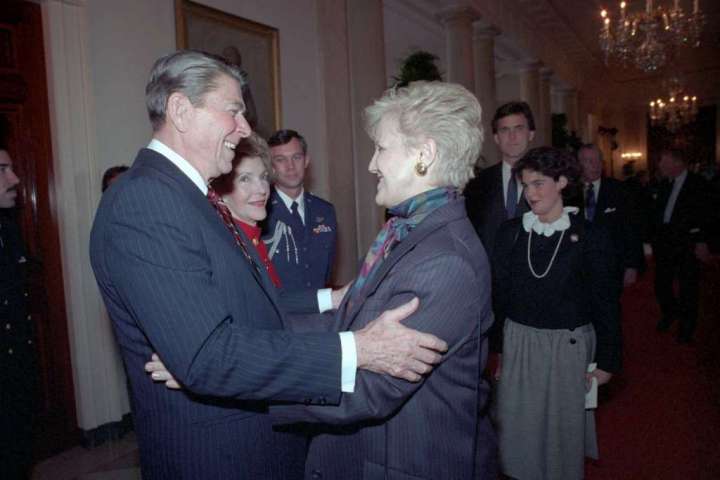Nancy Clark Reynolds, a confidante and aide to Ronald and Nancy Reagan who parlayed her influence within Republican circles into a long career as a Washington lobbyist and power broker, died May 23 at an assisted-living facility in Santa Fe, N.M. She was 94.
Nancy Clark Reynolds, Reagan confidante and D.C. power broker, dies at 94

The daughter of a Democratic congressman and then senator from Idaho, Mrs. Reynolds came of age in Washington in the 1930s and ’40s, a time when most women could scarcely imagine pursuing professional lives like the one she eventually achieved.
Her career began in the 1950s on a dare. Then the mother of several young sons, she accepted a challenge from an acquaintance to try out for an on-air job at WBAL-TV in Baltimore, according to a profile published in Washingtonian magazine in 2007. The job was hers.
By the 1960s, she was co-anchoring the evening news on a television station in San Francisco. She also covered politics and interviewed Ronald Reagan when the former Hollywood actor ran for California governor in 1966, making the connection that would shape much of the rest of her life.
After winning the gubernatorial election that year, Reagan hired Mrs. Reynolds as an assistant press secretary and later special assistant. When Reagan was elected to the White House in 1980, she served on the transition team of incoming first lady Nancy Reagan. Within Reagan’s inner circle, her son Michael Reynolds recalled, she became known as “the other Nancy.”
Frank Carlucci, who served under Reagan as national security adviser and later defense secretary, described Mrs. Reynolds as Nancy Reagan’s “best friend.” In an oral history with the University of Virginia’s Miller Center, he recalled that Mrs. Reynolds provided “early warnings” about the deteriorating relationship between the first lady and White House Chief of Staff Donald T. Regan, who ultimately left office in 1987.
In 1981, President Reagan appointed Mrs. Reynolds as the U.S. delegate to the U.N. Commission on the Status of Women, and in 1985 she served as co-chair of the U.S. delegation to the U.N. Decade for Women World Conference in Nairobi.
Mrs. Reynolds’s ties with the Reagans made her a sought-after figure in Washington, particularly when she partnered with Anne Wexler to form one of the city’s first bipartisan lobbying operations.
Wexler, a former aide to President Jimmy Carter, a Democrat, had already established Washington’s first major lobbying outfit run by a woman. Mrs. Reynolds joined the firm in 1983, making it a formidable cross-aisle force.
Because they were women, Wexler was said to have told Mrs. Reynolds that “we’re going to be underestimated, and it’ll work every time.”
They became, in the description of the New York Times, “two of the best-known political operatives in the capital,” with clients including General Motors, American Airlines and MCI Communications.
“The name of the consulting game is how many people you know and the ease with which you can call them and ask them questions, if nothing else,” Mrs. Reynolds told The Washington Post in 1992. “Everybody is dependent on everybody else here. It’s a friendly feeding game.”
Nancy Worth Clark was born in Pocatello, Idaho, on June 26, 1927. Her mother was a homemaker and volunteer.
Her father, David Worth Clark, served in the U.S. House from 1935 to 1939 and then in the Senate until 1945. The Clark side of the family produced two Democratic governors of Idaho in the late 1930s and early 1940s, Barzilla Clark and Chase Clark. An uncle on Mrs. Reynolds’s maternal side, Robert E. Smylie, was a Republican who served as Idaho governor from 1955 to 1967. (Mrs. Reynolds, for her part, told Washingtonian that she became a Republican after interviewing Sen. Barry Goldwater of Arizona, the conservative standard-bearer who was the GOP nominee for president in 1964.)
During her father’s time in Washington, Mrs. Clark and her family lived in the Shoreham hotel, prompting Washingtonian to describe her as “D.C.’s Eloise,” a reference to the protagonist of the children’s picture book series by Kay Thompson and Hilary Knight about a precocious girl who lives in New York City’s Plaza Hotel. Mrs. Reynolds recalled her father playing poker with President Harry S. Truman.
She was a 1945 graduate of Immaculata high school in Washington and received a bachelor’s degree in English from Goucher College in Baltimore in 1949.
After her first marriage, to Bill Wurzberger, ended in divorce, Mrs. Reynolds returned to Idaho, where she hosted a daytime talk show before moving to California. Between Reagan’s time in the California governor’s mansion and his election to the White House, she did lobbying work for Boise Cascade, an Idaho-based manufacturer and supplier of building materials, and for Bendix, a manufacturing concern.
Mrs. Reynolds served for a period as president of Wexler, Reynolds, Harrison & Schule, as the firm she formed with Wexler was formally known. The business was acquired in 1990 by Hill & Knowlton.
Mrs. Reynolds’s second marriage, to Frank Reynolds, a journalist, Republican campaign aide and lobbyist, ended in divorce.
Survivors include her longtime companion, Bob Kemble of Albuquerque; three sons from her first marriage, Clark Wurzberger of Weimar, Calif., Dean Wurzberger of Allen, Tex., and Kurt Wurzberger of University Park, Md.; a son from her second marriage, Michael Reynolds of Annandale, Va.; and four grandchildren.
Asked for her advice for Washington lobbyists, Mrs. Reynolds once counseled against thinking in “partisan terms.”
One must “stand back and look at Washington with a jaundiced eye and a great deal of humor,” she remarked to the Times. “You have to see it through that prism and be able to laugh at yourself and at a lot of what goes on.”






